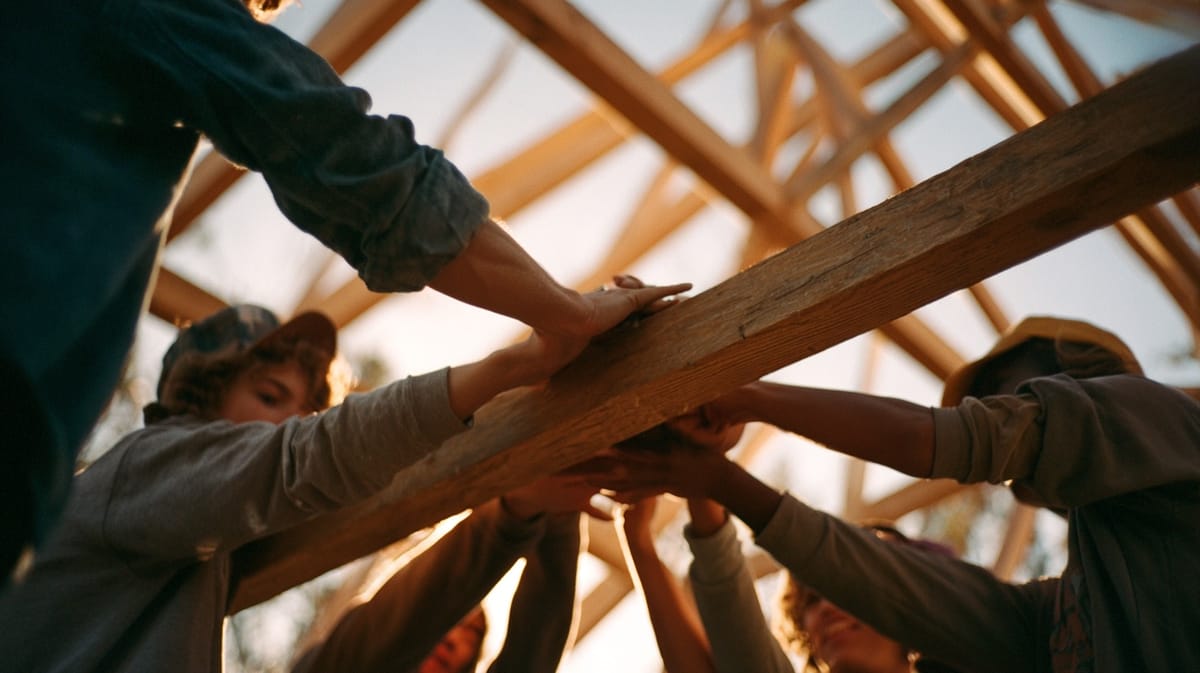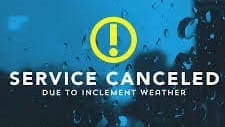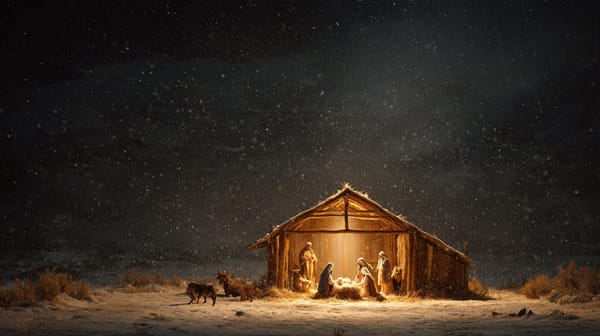Laity Sunday 10-19-2025

Summary
In this week’s service, James Campana delivered a thought-provoking sermon centered around Lady Sunday and the vital role of lay Christians in ministry. He challenged the traditional clergy-laity dichotomy prevalent in many churches, arguing that it contradicts biblical teachings and limits God's work. Campana emphasized that God equips every individual with gifts and talents to serve others and bring praise, asserting that the mission of God should not be confined to clergy alone.
Drawing on the story from Mark’s Gospel where Jesus instructs his disciples to feed a crowd of 5,000, Campana highlighted the extraordinary power that flows through ordinary people when they respond to God's call. He used the analogy of a carpenter building bridges instead of fences, illustrating how acts of reconciliation and service, performed by everyday individuals, can create connections and demonstrate God's transformative power. Ultimately, Campana concluded that we, as the church, are called to participate in God's work, building bridges and extending His grace through ordinary means.
Transcript
Well, today is Lady Sunday, and as such, we focus and celebrate the ministry of all lay Christians by having lay people plan and lead the entire worship service. First off, a big thanks to those who graciously agreed to be part of this service, including Rachel and Brian, who worked tirelessly behind the scenes to produce these awesome visuals that you see. And thank you all today for attending. As your administrative chair, I constantly ask myself, what is wrong with the church in our society today? Why is it declining? Why is it apparently seemingly lacking spiritual vitality? No doubt, many factors could be cited to explain why churches and even denominations plateau and decline.
But I believe that this enormous and comprehensive anomaly is that somewhere in church history there developed the notion of clergy, those paid to do ministry, and laity, those who receive the ministry. This clergy-laity dichotomy model suggests that ministers are paid to do the ministry and that the common folks in the pews pay them to do it. But this is not what the Bible teaches us at all. What we find in the Bible may not be what we have accepted through tradition, but it is what God intends.
I strongly believe that the mission of God cannot and should not be limited to clergy only. God has given leaders and leadership gifts to every church, equipping them to do the work of service or ministry. God has blessed each one of you with gifts and talents and resources. And we have received our godly gifts for two purposes: to serve others and to bring praise to God.
This dynamic truth means that everyone is to be engaged in ministry, not just the work of some hired holy man or woman to do all the ministry. We are the church, you and me, and Laity Sunday helps keep us and that thought in perspective. After a hard day's work by Jesus' disciples, he tells them it's time to rest. So they pile on a boat and sail away.
Can you just imagine their relief? peace, quiet, rest. So when they pound the boat, there they go, up the coast. The disciples were ordinary people, and Jesus gave them rest. in an ordinary way.
The plan was to land up the coast a piece, but the crowd could see where Jesus and the disciples were going and the word spread. And by the time they landed, a crowd had already assembled, 5,000 plus in all. Yet, instead of being frustrated, Jesus has compassion for them and he begins to teach them. Now, it's getting on towards supper time and the disciples say to Jesus, Hey, we're out here in the middle of nowhere in this countryside.
It's beautiful, but there's nothing here. Send these people away so they can go and buy something to eat. You give them food to eat, Jesus tells them. What? How is that possible? We have no money, they reply.
Jesus says, Go, look, and see what you do have. The disciples walk through the crowd gathering five loaves and two fish. Have the people sit down, Jesus tells them. So the disciples have the people sit on the fresh green grass.
Jesus blesses the food and gives it to his disciples to give to the people. They pass it out, up, down, around, and some more. Everybody eats until they are full. The disciples then gather up the leftovers.
Twelve baskets full, after 5,000 people were fed. and some more. What just happened here? The disciples were ordinary people, and they were doing a very ordinary thing, passing out food, waiting tables, people eating. Hard to think of an activity that isn't more ordinary.
They were passing around plain old bread and some fish too. You can't get more basic than bread. So we have ordinary men doing an ordinary task with ordinary food. It's hard to think of anything more ordinary, more run of the mill than that.
But what really happened? Jesus multiplied the bread. How did he do it? Where and when did this happen? Unfortunately, Mark's text really doesn't say. And that, my friends, is the point. It's not about how Jesus multiplied the loaves and the fish.
It's about how he fed the people. Remember, the disciples' plan was to send the people away. But Jesus said to them, You feed them. Notice, Jesus didn't say, I'll feed them.
His plan was for the disciples to feed the people. But the disciples didn't get his plan, and they did not understand. By now you think they would have. They've seen miracles before.
In fact, they had just done miracles themselves, as Mark relates earlier in his gospel. Jesus gave them the authority to cast out demons to heal the sick and they not he had gone out earlier and done that then they came running back telling Jesus everything that they had done so now Jesus tells them you feed them but they don't get it They were blinded by their own unbelief, so blinded that they did not even see what they did have. Jesus had to tell them, go, look, see what you have. They bring Jesus the bread and the fish.
He blesses them and gives it to his disciples to hand out. We don't know from the text whether they are believing Jesus just yet, but they are at least willing to obey him and hand out food to the people. Do you see what's happening? Jesus is doing an extraordinary thing, providing food for the people. He is multiplying the bread and the fish so there is more than enough for all to eat.
Everyone's needs are met. And yet, how is Jesus doing this? He's doing this extraordinary thing through his disciples. Jesus did not change his plan. His plan was for the disciples to feed the people, and they do.
They are the ones handing out the food. Jesus is an extraordinary God doing an extraordinary thing through ordinary people. The disciples aren't able to multiply this food on their own, but they hand it out at the command and the word of Jesus, and everyone is fed. And in their doing, the ordinary becomes the extraordinary.
And that's the way God works, isn't it? The water is plain water, but at the command and word of Christ through ordinary human hands, it becomes baptism and does extraordinary things like cleansing sins and giving faith. simple wine, ordinary bread, but that the command and the word of Christ through ordinary human hands, it is the life-giving meal of his body and blood, uniting us with him and each other. We are the church. We are the disciples.
We are the baptized. We are the believers. We are the followers of Christ. But we cannot do the work of Christ on our own.
But by the word of Christ, God does the work in and through his church, through us, the laity. Just as there were more than enough bread, God keeps doing extraordinary things through his church. We, you, me, are just ordinary people. Fairhaven is an ordinary church in an ordinary town.
But our God is an extraordinary God who does extraordinary things through ordinary everyday means. It's when we do ordinary things at the command and the word of Christ, the extraordinary happens. Once there were two brothers. Their father had a large farm, and when he became too old to work, he called his sons to him.
I will divide my farm in half and give each of you one half of it. When the brothers first started farming on their adjoining farms, they were the best of friends and would share everything together. Then one day, there was an argument between the two brothers and they stopped speaking to one another. For many years, not a word was spoken between them.
One day, a carpenter came knocking at the door of one of the brothers saying, I would like to do some work. Do you have any work that I can do? The brother thought for a moment and replied, I would like you to build a high fence on my property. Build it down near the stream there that separates my farm from my brothers. I don't want to see my brother anymore.
Later, he went down to see the carpenter's work and was shocked. Instead of building a high fence there, he had built a bridge over the stream. At the same time, his brother walked toward him from the other side. After all the terrible things that I've done over the years, I can't believe that you would welcome me back, his brother said.
The brothers hugged. Later, as the one brother walked back up to his farmhouse to talk to the carpenter, he asked, Can you stay? I have more work for you to do. The carpenter answered, I'm sorry. I can't stay.
I have to go, for I have many other bridges to build. We are no longer ordinary people. God transforms us into living epistles through our actions. It's only when the light and love of Christ shines in and through us that God's work is done.
God has done the extraordinary in you. He has called you, he has washed you, and he has made you his own. Having redeemed you, he is willing and able to do the extraordinary through you. We may be ordinary people, but we belong to an extraordinary God.
The disciples had their plan. Often we have ours. What did Jesus say? What was his plan? Jesus didn't say, I'll feed them. You feed them.
His plan then is the same as it is now for his disciples, for us, the laity, to feed the people. I realize that nothing I have said this morning is particularly original or insightful, but then again neither am I. I am just an ordinary man serving an extraordinary God. I am not I'm sure you would like me to stay and elaborate more on the subject of laity.
But I can't stay. I am the church. And you are too. I have to go.
For I have many other bridges to build. So do you. Amen.



